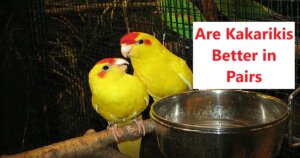Why Does My Kakariki Bite? Uncover the Surprising Reasons
Kakarikis are vibrant and playful parrots. But sometimes, they bite.
Wondering why your Kakariki bites? You’re not alone. Many Kakariki owners face this puzzling behavior. Understanding the reasons behind their biting can help you address and minimize it. Kakarikis, like other parrots, use their beaks to explore, play, and communicate.
Biting can be a result of fear, territorial behavior, or even just curiosity. Recognizing the signs and reasons is crucial. In this blog post, we will delve into the common causes of Kakariki biting and provide insights to help you foster a better relationship with your feathered friend. Stay tuned to learn more about your Kakariki’s behavior and how to manage it effectively.

Credit: www.reddit.com
Common Reasons For Biting
Understanding why your Kakariki bites can help you address the behavior effectively. There are several common reasons why your bird might be biting. Knowing these can help you create a more harmonious relationship with your feathered friend.
Territorial Instincts
Kakarikis, like many birds, are territorial. They may bite to protect their space. Your bird might see its cage as its domain. When you reach inside, it may feel threatened. This is a natural instinct for many animals, including birds.
Fear And Anxiety
Fear and anxiety can also cause biting. If your Kakariki feels scared, it may bite in self-defense. New environments, loud noises, or sudden movements can trigger this response. Birds that have been mistreated in the past are more prone to this behavior.
| Reason | Description |
|---|---|
| Territorial Instincts | Protecting their space, especially their cage. |
| Fear and Anxiety | Feeling scared or anxious due to new environments or past mistreatment. |
By understanding these common reasons, you can take steps to reduce biting and build a stronger bond with your Kakariki.

Credit: www.reddit.com
Health-related Causes
Understanding why your Kakariki bites is crucial for both you and your pet. Health-related causes are significant factors to consider. These issues can range from pain and discomfort to nutritional deficiencies. Addressing these health concerns can help reduce biting behavior.
Pain And Discomfort
Pain can make your Kakariki bite. Birds hide pain well, so watch for signs. Look for changes in posture or reduced activity. A bird in pain may become more aggressive. Common causes include injuries, infections, and arthritis. Regular vet check-ups can help catch these issues early.
Nutritional Deficiencies
A poor diet can lead to biting. Kakarikis need a balanced diet. Lack of essential nutrients affects their mood. They may bite to express their discomfort. Ensure they get enough vitamins and minerals. Fresh fruits, vegetables, and quality bird pellets are vital. Avoid feeding them only seeds.
Behavioral Issues
Kakarikis are known for their lively and curious nature. Yet, they can sometimes develop biting habits. Understanding the behavioral issues behind this can help in addressing and rectifying the problem effectively.
Lack Of Socialization
Lack of socialization is a common cause of biting in Kakarikis. Birds that are not exposed to different people and environments may feel threatened. This can lead to defensive behaviors, such as biting.
- Fear of Strangers: Birds not used to strangers may bite out of fear.
- Unfamiliar Environments: A new setting can make a Kakariki anxious and more likely to bite.
- Limited Interaction: Kakarikis need regular social interaction to feel secure.
Regular interaction with your bird can help reduce fear and anxiety. Introduce them to different people and environments gradually.
Poor Training
Training plays a crucial role in a Kakariki’s behavior. Poor training can lead to undesirable habits, including biting.
- Inconsistent Commands: Inconsistent training can confuse your bird.
- Lack of Positive Reinforcement: Birds respond well to rewards. Lack of rewards can lead to frustration and biting.
- Ignoring Bad Behavior: Not addressing biting behavior can reinforce it.
Consistent training with positive reinforcement can help mitigate biting. Use treats and praise to reward good behavior.
| Training Tip | Benefit |
|---|---|
| Use Treats | Encourages positive behavior |
| Consistent Commands | Reduces confusion |
| Address Biting Immediately | Prevents reinforcement of bad habits |
Implementing a structured training routine can significantly reduce biting behaviors.
Environmental Factors
Environmental factors play a significant role in your Kakariki’s behavior. Your bird’s biting habit may be influenced by its surroundings. Understanding these factors can help you create a more comfortable environment for your pet.
Inadequate Space
Kakarikis need ample space to move and explore. A cramped cage can cause stress and frustration. These feelings may lead to biting as a form of release. Ensure your bird has enough room to spread its wings and play.
Provide a spacious cage with toys and perches. Your Kakariki will feel more relaxed and less prone to biting. A larger cage can improve its overall well-being and behavior.
Loud Noises
Loud noises can startle and scare your Kakariki. This stress can result in biting. Birds are sensitive to sounds and may react negatively to sudden loud noises.
Keep your bird’s environment quiet and calm. Avoid placing the cage near noisy appliances or busy areas. A peaceful setting helps reduce stress and biting behavior.
Hormonal Changes
Hormonal changes in Kakarikis can lead to biting behavior. Hormones play a crucial role in their development and behavior. Understanding these changes can help you manage and reduce biting incidents.
Breeding Season
During breeding season, Kakarikis experience a surge in hormones. This makes them more territorial and aggressive. They may bite to protect their space or mate. Providing a calm environment can help reduce stress.
Adolescence
Adolescence is another period of hormonal changes for Kakarikis. Young birds undergo physical and behavioral changes. They may test boundaries by biting. Patience and training can help them adjust.
Misinterpreted Signals
Understanding your Kakariki’s behavior can be challenging. Misinterpreting signals can lead to confusion and frustration. Biting is a common behavior that owners often misunderstand. It’s not always a sign of aggression. Let’s explore some reasons behind this behavior.
Playfulness Mistaken For Aggression
Kakarikis are energetic birds. They love to play and interact. During play, they might use their beaks. This can seem like biting. They aren’t trying to hurt you. It’s their way of exploring and engaging. Recognizing playful behavior can help you avoid misinterpreting it as aggression.
Exploratory Biting
Kakarikis use their beaks to explore. They might bite objects or fingers. This is natural behavior. They are curious creatures. Biting helps them learn about their environment. It’s not meant to be harmful. Understanding this can help you react appropriately.
Preventive Measures
Preventing your Kakariki from biting can be challenging. Yet, with the right measures, you can create a harmonious bond. By understanding and applying preventive strategies, you can help your bird feel safe and secure.
Proper Handling Techniques
Handle your Kakariki gently. Never grab or squeeze them. Use a calm voice when interacting with them. This helps build trust. Offer your hand slowly for them to perch on. Avoid sudden movements. These can startle your bird and lead to biting.
Spend time with your Kakariki daily. This helps them feel comfortable around you. Reward good behavior with treats. Positive reinforcement encourages gentle interactions. Over time, your bird will learn to trust you more.
Creating A Safe Environment
Ensure your Kakariki’s cage is spacious. They need room to move freely. A cramped cage can cause stress. Stress often leads to biting. Place the cage in a quiet area. Avoid loud noises and sudden disturbances.
Provide plenty of toys and perches. These keep your bird entertained. Boredom can lead to bad behavior. Rotate toys regularly to keep things interesting. This helps prevent biting due to boredom.
Maintain a consistent routine. Birds thrive on routine. A predictable schedule makes them feel secure. Feed and interact with them at the same times daily. This reduces anxiety and biting incidents.

Credit: www.reddit.com
Building Trust
Building trust with your Kakariki is essential to reduce biting. Trust creates a bond that makes your bird feel safe and secure. This bond helps in understanding your bird’s needs and actions better. Below are some effective methods to build trust with your Kakariki.
Positive Reinforcement
Positive reinforcement encourages good behavior. Offer treats when your Kakariki behaves well. This could be a favorite fruit or a small toy. Use a calm voice to praise your bird. Reward every time your Kakariki does not bite. This makes the bird associate good behavior with treats.
You can use a clicker for training. Click when your bird behaves well and then give a treat. Over time, your Kakariki will understand what actions earn rewards. This method helps build trust and reduces biting incidents.
Consistent Interaction
Consistent interaction with your Kakariki is vital. Spend time talking to your bird daily. Use a gentle tone to make your bird feel comfortable. Handle your Kakariki regularly but gently. This helps your bird get used to human touch.
Play with your Kakariki using toys. Introduce new toys to keep your bird engaged. Playing games like fetch can also be a great bonding activity. The more time you spend, the more your bird will trust you.
Patience And Understanding
Building trust takes time. Be patient with your Kakariki. Understand that biting is often a sign of fear or discomfort. Try to identify the reasons behind the biting. Is your bird scared? Is it feeling unwell? Addressing these issues can help in reducing biting.
Always approach your bird calmly. Sudden movements can scare your Kakariki. Speak softly and move slowly around your bird. This helps in creating a safe environment, promoting trust.
Building trust with your Kakariki involves patience, consistent interaction, and positive reinforcement. These methods will help in reducing biting incidents and create a strong bond with your bird.
Frequently Asked Questions
Why Does My Kakariki Bite Me?
Kakarikis may bite due to fear, stress, or territorial behavior. Observe their body language and environment. Ensure they feel safe and comfortable.
How Can I Stop My Kakariki From Biting?
To stop biting, build trust through gentle handling and positive reinforcement. Avoid sudden movements and provide a calm environment.
Are Kakarikis Aggressive By Nature?
Kakarikis are not naturally aggressive. They can become nippy if stressed, scared, or mishandled. Understanding their behavior helps reduce biting.
What Triggers Kakariki Biting Behavior?
Biting can be triggered by fear, lack of socialization, or feeling threatened. Ensure your Kakariki feels secure and well-socialized.
Conclusion
Understanding why your Kakariki bites helps improve your bond. Observe their behavior closely. Address their needs promptly. Spend quality time with them daily. Patience and consistency are key. Use positive reinforcement to encourage good behavior. Seek professional advice if needed.
A happy Kakariki is less likely to bite. Build trust through gentle interactions. Your efforts will pay off. Enjoy a loving relationship with your feathered friend.
Hello Dear, I'm Poli Kolymnia, owner of many birds (including budgies).
With a deep passion for these feathered companions, I'm here to share my expertise and extensive knowledge on birds care.
My articles cover essential topics like diet, housing, care, and health, providing practical tips to help you create a happy and thriving environment for your birds.





